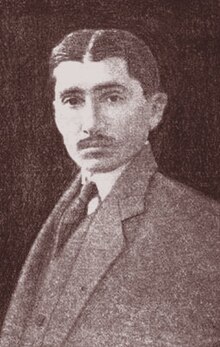Urmuz
| Urmuz Demetru Dem. Demetrescu-Buzău |
|
|---|---|

Urmuz, circa 1920, photographer unknown
|
|
| Born | March 17, 1883 Curtea de Argeș |
| Died | November 23, 1923 (aged 40) Bucharest |
| Pen name | Ciriviș, Hurmuz |
| Occupation | writer, humorist, judge, clerk |
| Nationality | Romanian |
| Period | ca. 1908–1923 |
| Genre | antinovel, aphorism, experimental literature, fable, fantasy literature, mythopoeia, nonsense verse, parody, sketch story |
| Literary movement |
Avant-garde Futurism |
Urmuz (Romanian pronunciation: [urˈmuz], pen name of Demetru Dem. Demetrescu-Buzău, also known as Hurmuz or Ciriviș, born Dimitrie Dim. Ionescu-Buzeu; March 17, 1883 – November 23, 1923) was a Romanian writer, lawyer and civil servant, who became a cult hero in Romania's avant-garde scene. His scattered work, consisting of absurdist short prose and poetry, opened a new genre in Romanian letters and humor, and captured the imagination of modernists for several generations. Urmuz's Bizarre (or Weird) Pages were largely independent of European modernism, even though some may have been triggered by Futurism; their valorization of nonsense verse, black comedy, nihilistic tendencies and exploration into the unconscious mind have repeatedly been cited as influential for the development of Dadaism and the Theatre of the Absurd. Individual pieces such as "The Funnel and Stamate", "Ismaïl and Turnavitu", "Algazy & Grummer" or "The Fuchsiad" are parody fragments, dealing with monstrous and shapeshifting creatures in mundane settings, and announcing techniques later taken up by Surrealism.
Urmuz's biography between his high school eccentricity and his public suicide remains largely mysterious, and some of the sympathetic accounts have been described as purposefully deceptive. The abstruse imagery of his work has produced a large corpus of diverging interpretations. He has notably been read as a satirist of public life in the 1910s, an unlikely conservative and nostalgic, or an emotionally distant esotericist.
...
Wikipedia
